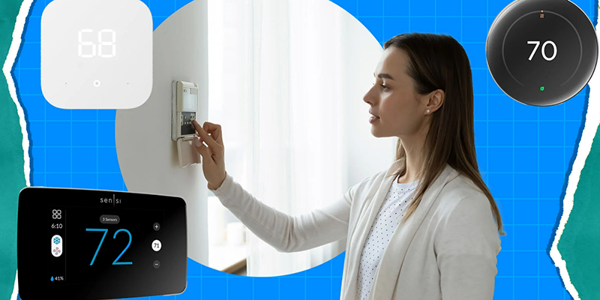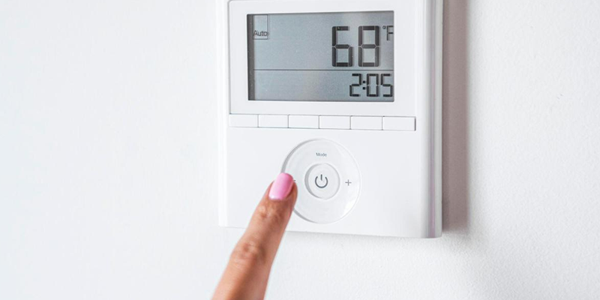Guide To Selecting The Best Smart Thermostat
Choosing a smart thermostat can be daunting. With so many options, features, and tech jargon, it's easy to get overwhelmed. But after trying dozens of models and sifting through research, I've figured out what it takes. Whether your goal is saving money, reducing energy waste, or simply making your home more comfortable, this guide covers everything you need to know.

Why Get a Smart Thermostat?
Before we get into the nitty-gritty, let's discuss why these gadgets are worth your time. Smart thermostats aren't just shiny toys—they're money-savers. These models often adjust heating and cooling based on your habits, such as turning down the heat when you're asleep or out of the house. Over time, that can take up to 8% or more off your energy bills. Also, they lower your carbon footprint, which is a plus for the planet.
I thought my old thermostat was excellent until I got my winter heating bills. I switched to an innovative model, and my costs fell by nearly 15%. If you're sick of never knowing if your AC is working too long, a smart thermostat removes the guesswork.
Types Of Smart Thermostats: Which One Is Right For You?
Not every smart thermostat is created equal. The good ones do the following in two ways: modulating thermostats, which dynamically adjust your heating system for maximum efficiency based on usage.
Weather Compensation Models
These thermostats adjust your home's temperature based on outdoor weather data. If it is sunny out, they will relax on heating. If there's a big freeze, they'll get your system ready. In addition, you have a specific extension of an element that saves energy and keeps your home comfortable.
Load Compensation Models
These calculate how complex your heating or cooling system has to work. They measure your home's insulation, room size, and even the draftiness of your windows. If your living room heats up faster than the bedroom, the thermostat compensates to even things out.
Weather compensation is a game-changer if you live somewhere with extreme weather (we're looking at you, Midwest winters). In older homes with uneven heating, load compensation ensures no room is too hot or cold.
Essential Features To Remember
Not all smart thermostats are the same. Here’s what to prioritize:
Learning Mode
For example, other thermostats—the Google Nest Learning Thermostat—monitor your habits over days or weeks. They can tell when you crank the heat up before bed or drop the AC down when you leave for work. Over a week, they'll have these patterns automated for you with no effort from your hands.
Geofencing
Or you might imagine your thermostat knowing when you're on your way home. Geofencing uses your phone's location to change the temperature as you get closer. If you're stuck in traffic, it will delay the heat until you are nearer.
Energy Monitoring
The top models indicate real-time energy use, so you'll be able to see just how much cash your AC gulps on a hot day. Some also send alerts if your system is working overtime, which can alert you to problems early on.
Humidity Control
If you live in a humid climate, look for a thermostat that can pair with dehumidifiers or humidifiers. This ensures your home's air is comfortable without straining your HVAC.
Occupancy Sensors
These senses motion in a room. The thermostat won't waste energy heating empty bedrooms if everyone's downstairs.
How To Be Energy Efficient And Save a Fortune
Saving energy is the whole point of a smart thermostat. Here’s how to maximize that:
Go Energy Star-Certified
These models strictly follow efficiency guidelines. They’re known to reduce heating and cooling bills by at least 8%.
Use Schedules
Temperature settings for Weekdays and weekends. Reducing your heater at night by 7°F can save about 10% annually.

Sync With Weather
None—Models that verify forecasts get adjusted earlier. If a heatwave is approaching, your air conditioning won't have to work overtime to chill the home.
After all, I once forgot to turn down the heat on vacation. Due to its "Away" mode, it automatically turned down the heat and saved me a small fortune.
Compatibility Check: Will It Work In Your Home?
Be sure to verify compatibility with your heating system—not all thermostats work with heat pumps, for example. If you want to connect multiple zones of a house, you'll need one that can control various systems.
Hvac Systems
They generally work with standard setups (forced air, heat pumps, radiant heating). If you have a boiler or baseboard heaters, verify compatibility.
Smart Home Integration
A general love for Alexa or Google Assistant? Ensure your thermostat is compatible with your voice assistant of choice.
Wiring
Older homes may require an adapter. The thermostat is the issue—for power, check if C-wire(standard wire) was used for this thermostat. If not, a few models include batteries or alternate power options.
Top Picks For 2025
Here are a few of the best based on our testing and reviews:
Nest Learning Thermostat (Gen 4)
The gold standard has a learning curve, a beautiful design, and integration with most smart home systems.
Toda
Perfect for prominent families. Its geofencing follows several phones, so the temperature rises and lowers depending on who's coming and going.
Hive
Great for beginners. The app is straightforward and works well with Alexa and Google Assistant.
Honeywell Evohome
Ideal for multi-room control. You can adjust temps for any zone in your home.
Tips For Installation: Need To Do It Yourself?
The vast majority of smart thermostats are DIY-friendly. If you're comfortable turning off a circuit breaker and crowding wires, install one in 30 minutes. But if your system is ancient or doesn't have a C-wire, call a pro. They will ensure that everything works safely.
Maximizing Your Investment
Once it’s installed, this is how to make the most of your thermostat:
Update Firmware
Improvements rolled out by manufacturers. Update your device for new features.
Clean Sensors
Sensors misread temperatures because of dust. Wipe them every few months.
Review Energy Reports
Most apps display monthly summaries. Use these to tweak settings.
Last Recommendations For Smart Thermostat Shoppers
Selecting a smart thermostat isn’t just about spec. It’s about lifestyle. If you frequently travel, set geofencing as a priority. If you live in a historic home, load compensation helps it heat evenly. And if you’re into voice control, go for one that works with your smart speaker.
The best thermostat is the one that will work with your routine; remember that! Spend time, show features side by side, and don't hesitate to ask for assistance. It's exactly what your wallet (and the planet) will thank you for.